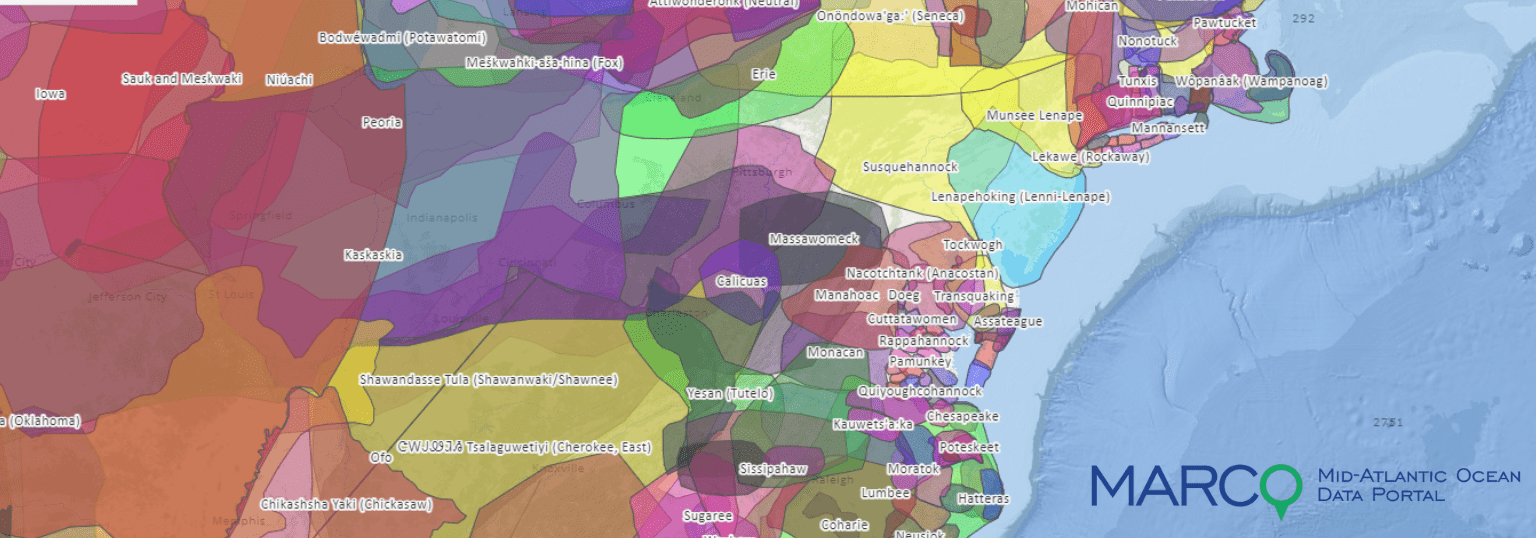TRIBAL RESOURCES & ENGAGEMENT
The Mid-Atlantic Regional Council on the Ocean is committed to improving and increasing engagement with State and Federally recognized Tribes in the Mid-Atlantic Region as well as those with ancestral ties to the Mid-Atlantic. Incorporating and preserving tribal knowledge within ocean conservation efforts not only deepens our understanding but also strengthens the effectiveness and long-term sustainability of conservation strategies.
MEETING PARTICIPATION
MARCO is looking to ensure Tribal members are able to attend as well as present at any meeting in which their Tribe has a vested interest. Please email info@midatlanticocean.org with the subject, “Tribal Member Travel Support Request” if you would like to participate in any of MARCO’s upcoming meetings and require travel support.
Upcoming Meetings:
Mid-Atlantic Ocean and Coastal Acidification Workshop
Offshore Wind Energy Transmission – Regional Planning Workshop
March 26-27, 2024
Baltimore, MD – IMET
TRIBAL DATA ON THE MID-ATLANTIC OCEAN DATA PORTAL
The Mid-Atlantic Ocean Data Portal has assembled an Indigenous Nations, Communities & Cultures map collection to assist with ocean planning and increase awareness of the region’s deep American Indian heritage and history.
Native Land Digital Map Layers
Native Land Digital granted permission to the Mid-Atlantic Regional Council on the Ocean (MARCO) to publish the following maps on the Portal:
Historic Native Terrestrial Territories (Not Reservation Boundaries)
This map depicts the approximate territories of Indigenous peoples throughout the world. Users may hover their cursors over territories to highlight their geographic extent and click on them for pop-ups containing links for more information about the communities from those areas on Native-Land.ca.
This map depicts the languages spoken by Indigenous peoples throughout the world. Users may click on the polygons for pop-ups containing links for more information about the languages from the areas on Native-Land.ca.
Native-Land.ca does not represent official or legal boundaries of any Indigenous nations. Native Land Digital welcomes suggestions, corrections and contributions to its data at https://native-land.ca/how-to-contribute/adding-maps/.
Ocean Stories
Tribal Lands, Leaders and Contact Info Map Layers
American Indian, Alaska Native, and Native Hawaiian Areas (Including Reservations)
This U.S. Census map depicts federally recognized American Indian reservations and off-reservation trust land areas, state-recognized reservations, state-designated tribal statistical areas, and other statistical entities around the nation. Users may click the areas for a pop-up identifying them.
The Bureau of Indian Affairs (BIA) first developed the Tribal Leaders Directory as an internal reference document for employees, but it became one of its most requested documents and is now used by government agencies, news media, businesses, researchers, and the public as a resource to help them connect with Indian Country. Users can click the points on the map for pop-ups containing the names and contact information for the leaders of federally recognized Tribal entities.
EPA Regional Tribal Operations Committee (RTOC) Regions
RTOCs are working committees of U.S. Environmental Protection Agency (EPA) and Tribal personnel. All federally recognized tribes within a region are considered members of the RTOC. Users can click the map for a pop-up containing the name and contact information for the RTOC representative from that EPA region.
Tribal Headquarters (State & Federally Recognized)
First published by MARCO in 2016, indicates the mail address locations for Tribal headquarters in the Mid-Atlantic states. It has been updated to reflect recent changes, including the addition of the Accohannock Indian Tribe, which gained state recognition from Maryland in 2017. Users can click the points to learn which tribe is based in the area.
FEDERAL & STATE TRIBAL RESOURCES
Contact us
Please fill out the contact form below or directly contact MARCO staff with questions, requests, or for additional resources.
Avalon Bristow
Executive Director
Email: abristow@midatlanticocean.org
Dr. Janet J. Reimer
Science Program Manager
Email: jreimer@midatlanticocean.org

